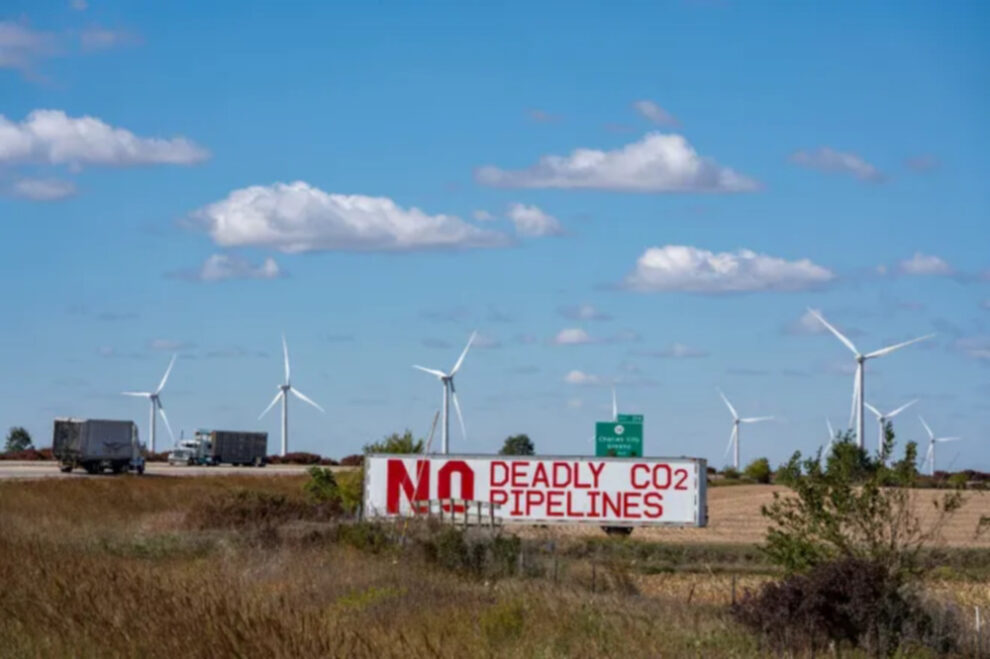Iowa regulators have concluded a hearing on Summit Carbon Solutions’ request to build a $5.5 billion carbon capture pipeline across the state, but their decisions on whether the Ames company should get a construction permit and eminent domain powers to acquire land access could take months.
Wally Taylor, an attorney for the Sierra Club’s Iowa Chapter, which opposes the project, said regulators are unlikely to issue a decision on Summit’s request until March or April, given the time needed to file legal arguments and responses. The Iowa Utilities Board said it faces no deadline for issuing an order on Summit’s request.
The three-member panel said the eight-week public hearing in Fort Dodge was the agency’s longest on record. It began Aug. 22, paused for about a month, and resumed Nov. 6 before ending Wednesday.
Opponents of the project said the board quashed input from residents who live near the proposed route but aren’t directly in its path, excluding their testimony during the hearing. The board, however, said it made the “uncommon decision” to allow the filing of additional written comments.
“This move allows hundreds of additional public comments to become part of the proceeding,” regulators said in a statement.
Here’s what you should know about the controversial project.
What’s the pipeline project about?
Summit has proposed building a pipeline across Iowa and four other states that would transport liquefied carbon dioxide emissions from about 30 ethanol plants to North Dakota for sequestration deep underground. The roughly 2,000-mile pipeline also would run through South Dakota and into Minnesota and Nebraska.
Summit, a spinoff from Iowa entrepreneur Bruce Rastetter’s Summit Agricultural Group, has said the carbon capture pipeline is critical to helping ethanol remain marketable as the nation seeks to reduce the greenhouse gases that contribute to climate change. Iowa is the largest U.S. producer of ethanol, which absorbs half the state’s also-U.S.-leading corn crop. Summit would be in line for billions of dollars in federal tax incentives for carbon dioxide sequestration.
Wolf Carbon Solutions also proposes to build a carbon capture pipeline in Iowa, but a third company, Navigator CO2 Ventures, dropped its bid to build a pipeline last month after hitting several regulatory hurdles.

Why do some Iowans oppose the project?
Residents’ concerns mostly center on safety and property rights. Heavier than air, carbon dioxide is an asphyxiant. Released into the atmosphere, the odorless, colorless gas sinks, displacing oxygen. Depending on concentration levels, exposure can cause anything from headaches and drowsiness to confusion and death. A 2020 carbon dioxide pipeline rupture in Mississippi resulted in evacuations, and dozens of people seeking medical attention.
Residents also oppose granting Summit’s request for eminent domain powers, which would enable the company to force unwilling landowners to sell it access to their land for pipeline construction. Landowners also are concerned about the construction’s impact on farmland productivity and drainage tiles beneath fields.
What does Summit say about opponents’ concerns?
Summit says it has reached voluntary agreements with 75% of impacted landowners in Iowa. “This figure underscores the community’s trust in the project and the benefits it promises,” the company said in a statement. “It also speaks to the company’s commitment to fair compensation and respectful land management practices.”
Summit contends the pipeline would be built to exceed exacting federal safety standards, with technology that provides immediate notification of leaks and ruptures so it can be shut off quickly. And Summit says any soil affected by the construction will be restored to its previous productivity, and farmers will be compensated for yield losses for three years.
How does this project compare to the controversial Dakota Access oil pipeline project?
The Iowa Utilities Board’s last hearing on a major pipeline was in 2015, when the builders of the Dakota Access oil pipeline sought permission for the 346 miles of the project across Iowa. Sixty-nine witnesses testified in 12 days of hearings, and the board received nearly 4,000 filings and 300 total exhibits. The board approved a permit for the pipeline in 2016 and granted eminent domain powers, a decision ultimately affirmed by the Iowa Supreme Court.
The board said that in the 26-day Summit hearing, it heard testimony from “dozens of scheduled witnesses,” including more than 100 landowners, and received more than 7,600 filings, including nearly 2,000 regular exhibits and 200 hearing exhibits. It also said it loosened rules to allow broader participation by landowners.
Do opponents feel the hearing has been fair?
The Sierra Club’s Iowa Chapter and others have voiced several concerns about the hearing, beginning with restrictions on who could testify. Farmers, livestock producers, school leaders and others who live or operate near the proposed pipeline, but who don’t own land it would directly cross, were not permitted to testify. “In the past, public input has been encouraged in contested cases, but this precedent appears to have been disregarded in order to further fast track the hearing,” the Sierra Club said in a statement.
What’s next?
The Iowa Utilities Board said it would set a schedule for additional legal filings. It said it has the option to grant the permit, grant it with modifications, or deny it. A decision to grant the permit would likely spark a legal challenge, said Taylor, the Sierra Club attorney. Summit also could legally challenge a permit rejection or ask the board to reconsider, he said.
In October, Summit said it doesn’t expect the pipeline, if approved, to become operational until 2026, two years later than initially projected, given regulatory hurdles and environmental and landowner opposition. Regulators have rejected Summit’s requests for permits in North and South Dakota, but the North Dakota Public Service Commission has agreed to reconsider the company’s plan. No date has been set for a rehearing.
Source : Des Moines Register






































